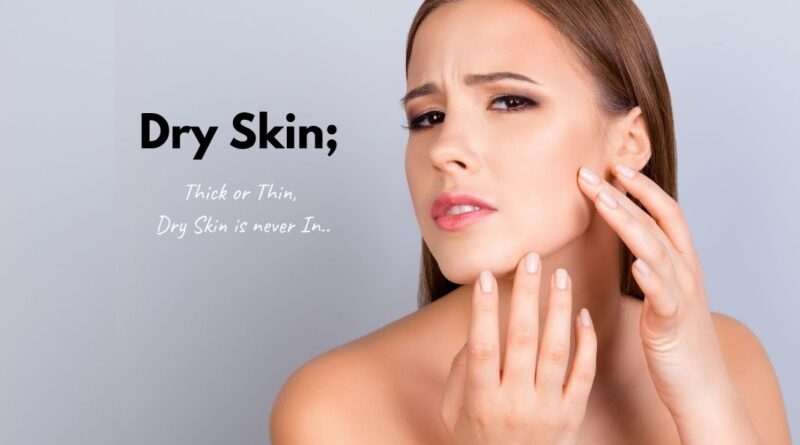How to Get Rid of Dry Skin Using Natural Remedies?
It is said that the road towards beautiful skin begins with exceptional care. Having said that, it is important to note that good, nourished, and healthy skin goes a long way in enhancing your looks.
However, the overuse of chemicals on your skin or improper diet or even weather conditions may dampen the beauty of your skin or lead to skin diseases.
In a clinical study(1) conducted in 2011, it was found out that over 40 percent of the population suffered from the dry and scaly skin that often caused itchiness and inflammation. This is definitely a large part of the population that suffers from skin related ailments mainly concerned with dryness.
Here we intend to focus on one of the most common skin problems that affect a large section of the population, dry skin and how natural remedies can help you improve the condition of your skin without having to resort to conventional medication that may have a precarious effect on your body.
Table of Contents
What Is Dry Skin?
Dry skin is quite a common skin condition that occurs due to the lack of appropriate quantum of water in the superficial layer of the skin which is commonly known as the epidermis. While this problem may occur to both males and females, the occurrence is more common in elderly people since over time, their body tends to lose natural oils leaving their skin dry and patchy.
Dry skin affects areas like arms, legs, face, hands, and even the back and varies in terms of intensity depending from person to person.
Natural Remedies for Dry Skin
- Food
- Essential Oils
- Herbs
- How to Prevent
CURE 1: How to Get Rid of Dry Skin with Foods
Nutrition plays an important role in ensuring healthy skin. On the other hand, a diet that is improper or unhealthy can lead to several diseases and bodily discomfort, one of them being dry skin. Here is a list of some of the best foods that you can consume in order to improve and retain healthy skin.
1. Fatty Fish
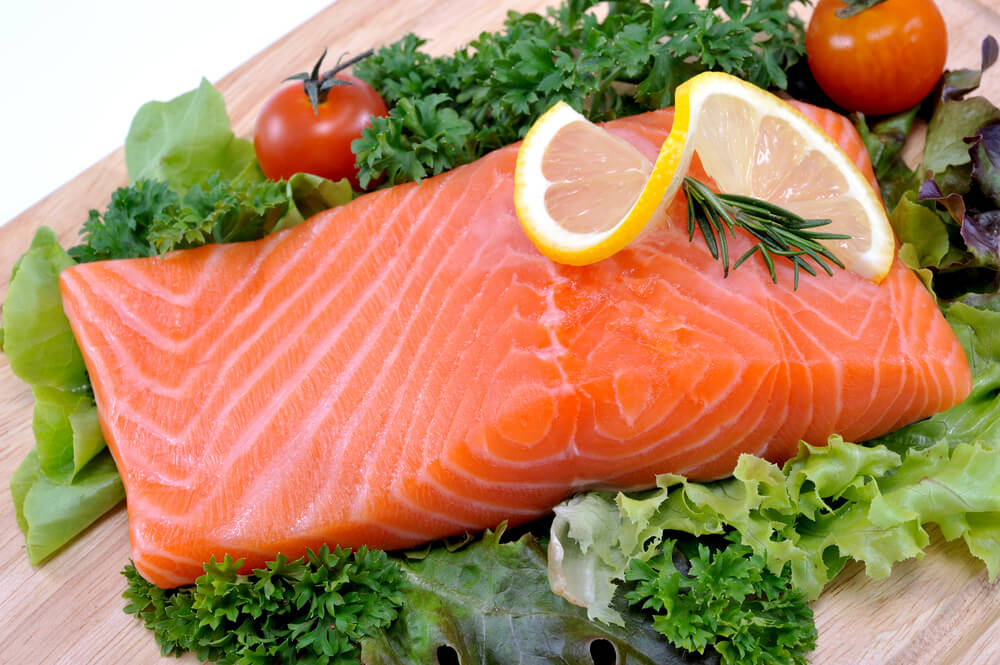
Fatty fish can go a long way in reducing inflammation on the skin and keeping it moisturized. In fact, they are an excellent source of Vitamin E, protein, and zinc.
Why does this work?
Fatty fish constitutes a rich source of omega-3 fatty acids that are instrumental in maintaining good skin health. Studies(2) reveal that these fatty acids help keep the skin supple and thick, thus preventing it from getting dry.
You would be surprised to know that consuming fatty fish also helps to reduce the inflammation on your skin that may be one of the main cause for acne and redness of the skin.
In fact, consuming omega-3 fatty acids help your skin become less prone to the harmful rays of the sun, also known as the UV or ultraviolet rays. Certain studies(3) also go on to show that using fish oil supplements can help prevent dangerous diseases such as lupus and even psoriasis.
The vitamin E present in fish is a great source of antioxidants. Consuming enough of this vitamin helps you keep your skin free from radicals. Additionally, the protein content of this seafood aids in supplementing the vitality of your skin and alleviating any dryness present.
The presence of zinc in fish reduces the time taken for healing any wounds to the skin and even reduces any burning sensation.
How much to use?
You can consume fatty fish in your daily diet, preferably every alternate day. In addition, you can also opt to consume fish supplements in the form of capsules.
2. Avocados

Avocados are beneficial in preventing dry skin. They are nutritious and also protect your skin from any damage including sun rays. Vitamins such as vitamin E and C are loaded in this food and these are extremely essential in the maintenance of good skin.
Why does this work?
Avocados are a good natural remedy to cure dry skin. Consuming sufficient avocados assists in keeping the skin moisturized and flexible. In a study(4) conducted on 700 women, it was found that a high intake of fats present in avocados resulted in supple skin.
Compounds present in avocados not only protect your skin from dryness but also reduce signs of aging such as wrinkles.
Additionally, antioxidants present in avocados help protect the skin from any sort of oxidative damage. Interestingly, avocados also provide adequate vitamin C, preventing your skin from drying and keeping it healthy.
How much to use?
A serving of around 100 grams or half an avocado provides for around 10 percent of vitamin E and over 17 percent of vitamin C to your body on a daily basis.
3. Walnuts

Walnuts contain important essential nutrients in addition to being rich in vitamin E and C, zinc, protein, as well as selenium. Walnuts are an excellent natural remedy for dry skin.
Why does this work?
Several studies have revealed that in comparison to other dry fruits and nuts, walnuts are richer in both, omega 3 and omega 6. While the former is instrumental in reducing any inflammation that the skin suffers from, the latter protects the body from diseases such as psoriasis. They also contain fatty acids that the body is unable to make by itself, thus making it an effective natural remedy to cure the problem of dry skin.
How much to use?
An ounce of walnuts weighing around 28 grams contains 6 percent of zinc, an adequate amount that is necessary for your skin to look good and assist in the proper healing of wounds thus fighting bacteria effectively in the body.
4. Broccoli

Broccoli is a great source of minerals and vitamins and aids in bettering the condition of the skin.
Why does this work?
Broccoli contains a compound called lutein which works just like beta carotene. It protects your skin from getting wrinkled and getting oxidized.
Another compound called sulforaphane which is found in broccoli acts as a protective agent, thus protecting your skin from harmful radiations of the sun. This compound not only switches on the protective systems of the body but it also neutralizes the harmful, free radicals.
How to use?
Include this veggie in your daily diet. You can eat it by adding it in your salad or even tossing it on a pan and adding a dash of some common spices on it.
How much to use?
There is no such limit on consuming this vegetable as it is loaded with a lot of nutrients and minerals. However, it is recommended that you add it in your meals at least every alternate day.
5. Tomatoes

Tomatoes are yet another natural remedy to cure dry skin. It is easily available and is quite affordable as well.
Why does this work?
Tomatoes are rich in vitamin C and also contain all the major carotenoids. A study revealed(5) that tomatoes are useful in preventing skin from getting dry due to exposure from the sun. They also reduce the common signs of aging that may occur on account of increasing age.
How to use?
Well, the list of methods to include tomatoes in your diet is endless. Right from eating it raw to incorporating it in a salad to making a curry and adding it to your lentils. Tomatoes can be used in a variety of ways depending on your taste and choice.
How much to use?
There is no such limit on consuming this vegetable as it is loaded with a lot of nutrients and minerals. However, it is recommended that you add it in your meals at least every alternate day.
6. Sweet Potatoes

Various studies have now settled on the fact that consuming sweet potatoes does help cure dry skin and nourish it so that dry cells do not adversely affect the skin. It is essential that sweet potatoes form an important part of the diet of every person looking to improve the quality of their skin.
Why does this work?
Sweet potatoes contain beta carotene that is mostly found in foods such as oranges, carrots, and spinach.
Carotenoids such as beta carotene act as a natural sunblock that helps prevent your skin from getting dry. In fact, when you consume sweet potato, the antioxidant present in the food protects your skin from any harmful exposure to the sun. It also protects your skin from wrinkling or other signs of aging.
Here is an interesting observation found in a particular study(6), a high amount of beta carotene in your body contributes to a light orange color to your skin that makes your skin look a lot more healthier and beautiful.
How much to use?
As mentioned above, sweet potatoes are a great measure for the prevention of dry skin. Half a baked potato around 100 grams is more than sufficient to help your skin to be nourished and healthy.
7. Red and Yellow Bell Peppers
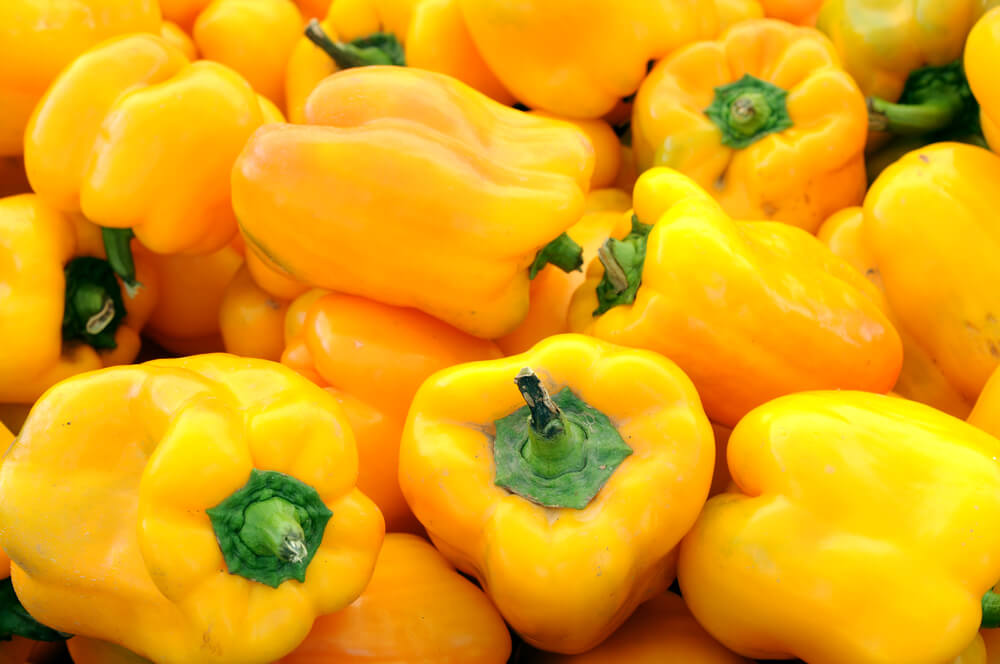
Just like sweet potatoes, bell peppers, too are rich in beta carotene and function as a natural remedy towards preventing dry skin.
Why does this work?
The beta carotene in red, as well as yellow bell peppers, are converted into vitamin A by the body. In fact, bell peppers are also a great source of vitamin C that is important for the production of collagen, an important protein that helps keep the skin nourished and firm.
A study(7) that was conducted in a large number of women showed that the females who consumed red and yellow bell peppers on a regular basis showed fewer signs of aging. In addition, they also showed reduced wrinkles on their skin.
How much to use?
A single cup of chopped bell peppers that amounts to around 150 grams constitutes 92 percent of the Recommended Dietary Allowance(RDA) of vitamin A required by the body. You can add them in your daily salads as well.
Also Read: DIY Pumpkin Face Mask For Different Skin Types
CURE 2: Essential Oils for Dry Skin
Dry skin has become a dire consequence of all the seasons throughout the year. It is essential that the prevention of dry skin includes the application of essential oils thereby helping the skin in staying hydrated and moisturized.
Since branded lotions and creams often come laden with artificial fragrances, preservatives, and dyes that may only increase the sensitivity of the skin, it is highly recommended that you choose to apply only natural essential oils on your body that are more effective and also save the skin from any potential damage.
Here are some of the most common essential oils that you can opt for:
1. Grapeseed Oil
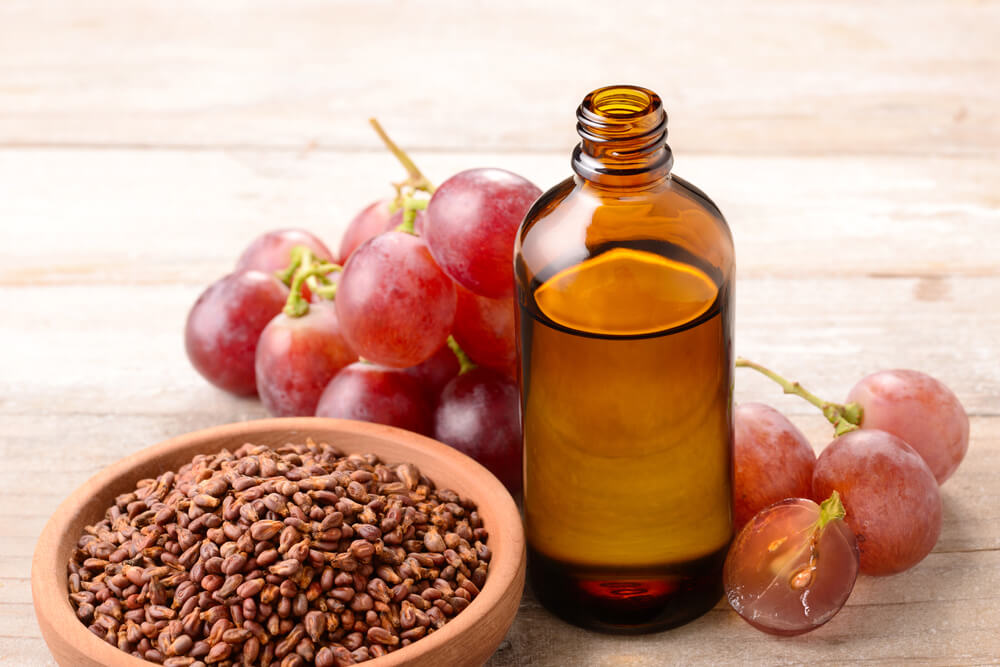
Grapeseed oil is one of the most effective natural remedies to prevent dry skin. It can be used on all skin types and is a great way to reduce anti-aging benefits.
Why does this work?
Grapeseed oil that is extracted from the seeds of none other than wine grapes. It is a lightweight oil rich in vitamin C and is great for sensitive skin or skin that is prone to acne.
Grapeseed oil prevents damage caused by exposure to the sun. Moreover, it helps increase the moisture levels of the skin by significantly decreasing transepidermal water loss. In addition, grapeseed oil also replenishes the lipids in the body which actually prevent the water content in the body from getting lost.
How to use?
You could simply take a few drops and apply it on your skin and massage thereafter. Make sure that you use the oil regularly to see better results. In case your skin experiences any side effects, visit the doctor immediately.
2. Argan Oil for Dry Skin
Argan oil is derived from the argan tree that is found in Morocco. It is proven to have moisturizing abilities and goes a long way in nourishing and protecting the skin from dryness.
Why does this work?
Argan oil is often called as Liquid Gold. It is extremely rich in nutrients that include vitamin E, as well as fatty acids. This oil is ideal to give your skin a natural boost since it is absorbed by the pores of the skin quite easily and does not irritate the skin. Argan oil also gives the skin a youthful glow, as well as reduces the wrinkles on it.
Your skin will seem much healthier than before as it will become more plump and supple.
How to use?
It is very easy to use argan oil since it is a non-greasy type of oil. All you have to do is apply it on the face and other areas of the skin by putting a few drops of it and massaging the area gently.
3. Lavender Oil
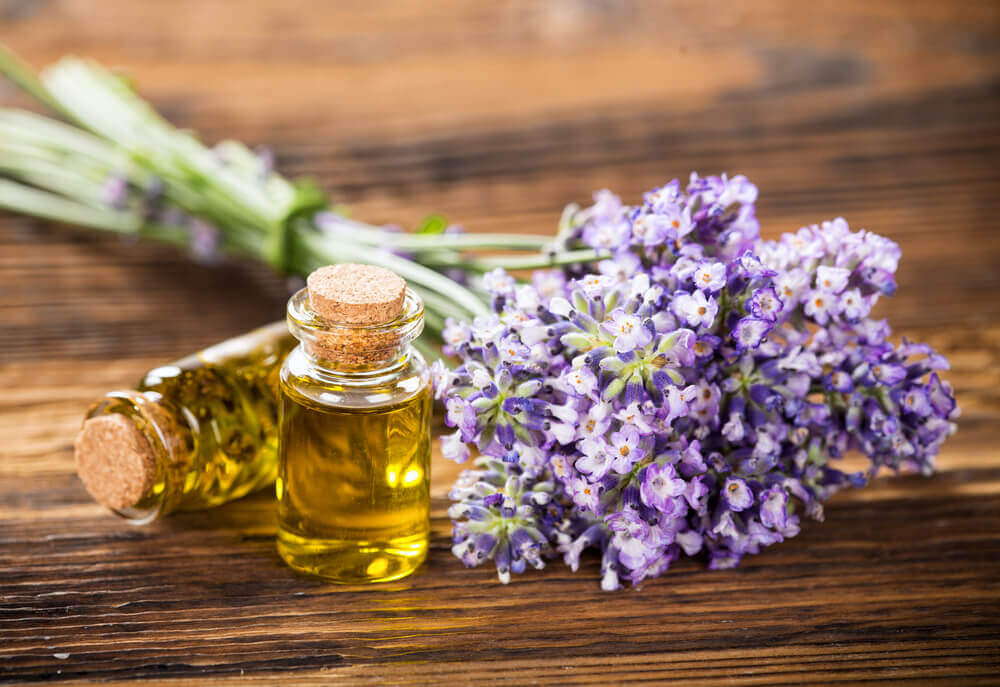
Lavender oil is collected from fresh lavender flowers and has a great fragrance. It is a natural remedy to cure the dryness of the skin.
Why does this work?
In case your dry skin patches have been itching for long, it is time that you started using lavender oil. This oil does a stellar job in bringing back the moisture of your skin and reduce the chances of itching. Not only does it help control the production of sebum in the body, it also soothes irritation and acts as a natural antiseptic, thus getting rid of any bacteria.
How to use?
You can use it simply by applying it on the wet body right after a shower or before going to bed at night.
4. Flaxseed Oil
Flaxseed oil is derived from the seeds of the flax plant. It is a natural remedy to cure dry skin and helps make the skin bouncy and bright.
Why does this work?
The antioxidants that are found in flaxseed oil are actually highly concentrated and therefore help you achieve a radical free skin in addition to protecting you from the harmful rays of the sun. The anti-inflammatory properties assist you to get relief from any irritation on the skin occurring due to dry patches on it. It even reduces redness on the skin.
According to studies(8), flaxseed oil is essential in getting rid of several skin diseases such as eczema, psoriasis, acne, rosacea, and even dermatitis. The fatty acids help the body repair the skin and give it a moisturized look.
It is important to note that a major cause of skin dryness is the deficiency of omega 3 in the diet. Applying flaxseed oil replenishes your body and thus prevents the occurrence of dry and flaky skin. Once you start applying this oil on a regular basis, you will be astonished to see the results.
How to use?
You can use this oil by applying it gently around the affected areas before sleeping. Since the oil does not have a very pungent smell, you can also apply it after taking a shower in the morning right before you leave for work so that the upshot of the application of the oil is effectual for the entire day.
5. Frankincense Essential Oil
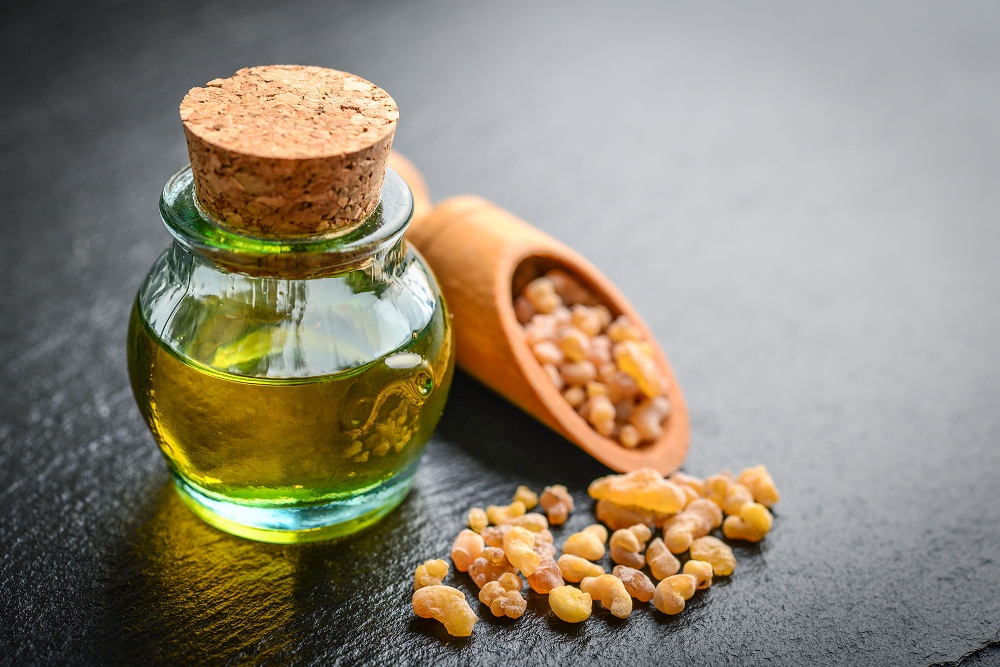
This is oil is made from the dried resin of some trees that belong to the Boswellia genus, native to Africa and the Middle East. Frankincense boosts a lot of medicinal properties and has been since centuries to treat several medical conditions.
Why does it work?
Frankincense Essential Oil has several chemical compounds, out of which boswellic acid is a known anti-inflammatory agent. This acts on the skin and helps in the reduction of pain and inflammation. It also helps in improving the skin condition.
How to use?
It is to be noted that before applying it on your skin, make sure you use a carrier oil and massage it in very gently. Dilute the oil using warmed up coconut oil and to the warm oil you could add 3-4 drops of the oil and then using a gauze could apply it on the rougher parts. It should also be noted that using the less concentrated version would be safer for your skin and help you avoid the burning sensation.
How much to use?
It is strongly advised that you use this regimen only for two weeks and then check for your symptoms, however, before you begin with this regimen it is advised that you consult your physician/doctor to check with them in regards to the dosage and the period.
Also Read: 5 Natural remedies for oily skin
CURE 3: Herbs for Dry Skin
Herbal remedies are yet another way to nourish dry skin. These remedies have been used by people all over the world since ages and have certainly proved to be an efficacious remedy to get rid of scaly skin and inflammation. Here are some herbal remedies for the treatment of dry skin.
1. Chamomile

Chamomile is an extremely soothing herb and is great for the skin.
Why does this work?
It helps heal the inflammation on the skin caused by itchiness or scaly skin. It works great by healing any wounds or rashes on the skin and even aids in reducing redness. As per studies, chamomile has anti-allergy and anti-inflammatory properties that help cure diseases such as psoriasis.
How to use?
The topical application and the ingestion of this herb in the form of chamomile tea can be extremely advantageous to the body in terms of curing dry skin.
2. Aloe Vera for Dry Skin
Aloe vera is yet another herbal remedy to cure dry skin.
Why does this work?
Aloe vera is a great option to reduce the inflammation caused by dry skin. This herbal remedy is easily available and is quite safe to use. It has antiseptic agents that help prevent irritation in dry skin. Aloe vera can penetrate into the layers of the skin and reach the deepest tissues of the body.
How to use?
Drinking aloe vera juice on a daily basis is a great way to nourish and moisturize your skin. In addition, you can also use it as a lotion to treat dry skin.
3. Horsetail
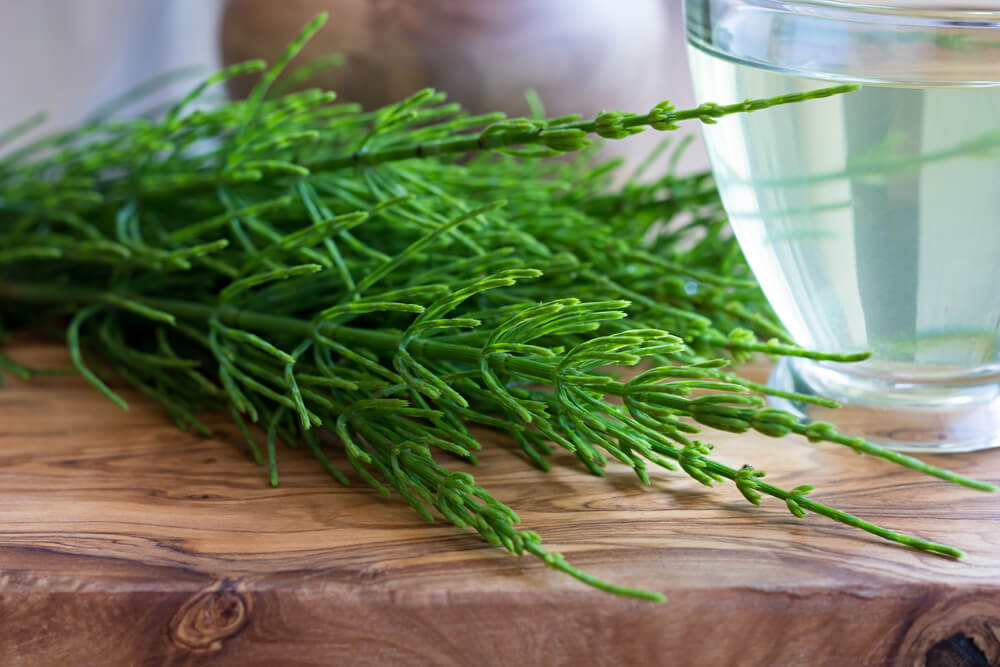
Horsetail has excellent properties that help firm the skin.
Why does this work?
It helps dry up any excess oil from the skin and helps keep the skin supple and flexible. It is a great herb to prevent itchiness and dryness that may be a result of aging. It binds blood vessels together and prevents the skin from getting wrinkles.
How to use?
You can add horsetail to any homemade moisturizer to make it a great skin-friendly cream.
4. Peppermint
The menthol present in peppermint has a cooling effect on the skin and helps reduce inflammation.
Why does this work?
The cold sensation helps resolve any issue pertaining to dry and scaly skin. Peppermint is extremely useful in achieving healthy and radiant skin.
How to use?
Only introducing a few drops of this herb to your daily beauty regimen is an efficacious way to get a sky that is well nourished and moisturized.
How to Prevent Dry Skin?
Dry skin is a common phenomenon. However, it is not incurable. You can prevent your skin from getting dry by opting for a better lifestyle and habits that let your skin remain hydrated at all times.
We have compiled a list of few tips that you can utilize to ensure that your skin remains all the more nourished and moisturized.
Bid Farewell to Hot Showers
There are only a few things that seem better than a hot shower on a winter morning. However, you must realize that hot water dries your skin quicker than anything else. Instead, we suggest that you use only lukewarm water and reduce the application of soap as much as you can so that you let the skin retain its bodily oils.
Drink Lots of Water
You would not disagree when we say that a majority of people suggest that you drink a lot of water whenever you ask them advice to cure dry skin. Well, they are right! Water is extremely essential to keep your skin hydrated. The more you let your skin stay without fluids, the more harmful it is for your skin. Drink around 8-10 glasses of water each day.
Remember How to Moisturize
The most common mistake most people make is applying any essential oil or moisturizer to the skin that is extremely dry. You must know that the basic aim of applying such moisturizers is to retain or trap the moisture in the skin.
Therefore, it is advisable that you dab your skin with a wet towel before applying the same. Prefer applying moisturizers that are natural and thick. A good way to check the same is blobbing it on the palm. If it runs off, that means it isn’t thick enough.
Avoid Sitting in Closed Environments
It is advisable that you use a humidifier in the winter so that the top layer of the skin does not get dry. Even in summers, ensure that you do not sit in air-conditioned rooms for longer durations since the air sucks the natural oils from your skin and makes it extremely dry.
Dry skin is a very common problem among people all over the world. In fact, as the skin becomes dry, it becomes more prone, as well as sensitive, to rashes and diseases. Natural and simple treatments and measures as having been enumerated in the sections above can prove to be effective and efficacious ways to treat dry skin.
These remedies do not contain any artificial elements and as such, do not pose any risk of potential harm to the body. A good diet and constant nourishment of the physical being are more than sufficient to ensure healthy skin.
In addition, try to adopt a healthy lifestyle and wise living habits that prevent you from dryness of skin and help you retain the glow on your face.
It is important to note that if dry skin is not cured at the right stage, it can produce serious complications that may only cause major discomfort to the body.
It is, therefore, strongly recommended that you take utmost care of your skin through natural treatments such as the application of essential oils, consuming foods rich in good fatty acids and high-quality protein, etc.
After all, healthy and strengthened skin is an added advantage to your physical appearance.
Frequently Asked Questions (FAQs)
Here are some Frequently Asked Questions (FAQs) pertaining to dry skin:
1. Can essential oils be applied on the face?
Ideally, there is no harm in applying essential oils on the face. However, one should keep in mind that if your skin is hypersensitive, it is strongly recommended that you consult a physician before applying the oil on your face.
2. What are the common signs and symptoms of a scaly skin?
The key symptom that tells you that your skin is dry is itching. People who have dry skin often experience severe itching on rough patches on the skin. More prominently, areas such as the hands, legs, and elbows begin to itch a lot. In such eventualities, it is advised that you take immediate steps to stop your skin from getting drier. A convenient way to instant relief would be to apply essential oil on the area that is itchy.
3. What food items help in getting rid of dry skin?
Well, foods that are rich in vitamins and antioxidants such as avocados and walnuts are extremely beneficial in curing dry skin. A diet rich in proteins and nutrients nourishes the body and replenishes the natural oils and lubricants in the body. Consume foods such as broccoli, bell pepper, milk, etc. to witness a marked difference in your skin. Of course, do not forget to drink plenty of water to improve the quality of your skin.
4. Are most dry skin cases a result of disease of infection?
Absolutely not. It will always do you good to remember that the skin is the body’s largest organ and is protected by natural lubricants and oils that retain its moisture. Most cases of dry skin are a result of external factors such as weather conditions, increased exposure to sunlight, improper diet, etc.
5. Do genes play a role in the occurrence of dry skin?
Dry skin may also occur due to a certain genetic condition that is known as ichthyosis. While there are several common types of this condition, ichthyosis vulgaris is the most common type. It is a condition where the skin turns extremely scaly and dry, often in the lower legs.
6. What kind of medical conditions cause the skin to become dry?
The causes of dry skin are many. It could be caused by certain medical conditions as well. Diseases such as diabetes, hypothyroidism, or even malnutrition contribute to dry skin. High dosages or medication for such diseases may also cause bodily fluids to dry up leading to dry skin.

